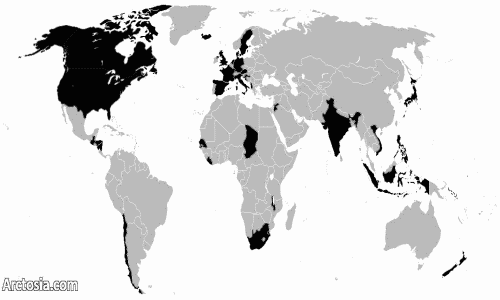“Hurt the feelings of the Chinese people”的版本间的差异
来自China Digital Space
(Created page with "伤害中国人民的感情 (shāng hài zhōng guó rén de gǎn qíng): hurt the Chinese people's feelings This is a phrase often used by China’s top diplomats when another ...") |
|||
| 第3行: | 第3行: | ||
This is a phrase often used by China’s top diplomats when another country or organization takes an action that offends the government. A Chinese blogger [http://www.fangkc.cn/2008/12/donot-hurt-chinese/ FangK] searched through the electronic archives of the People's Daily between 1946 and 2006 and discovered that 19 countries and organizations have been accused of hurting the feelings of the Chinese people. As [http://www.danwei.org/foreign_affairs/a_map_of_hurt_feelings.php translated by Danwei], these countries and organizations are: | This is a phrase often used by China’s top diplomats when another country or organization takes an action that offends the government. A Chinese blogger [http://www.fangkc.cn/2008/12/donot-hurt-chinese/ FangK] searched through the electronic archives of the People's Daily between 1946 and 2006 and discovered that 19 countries and organizations have been accused of hurting the feelings of the Chinese people. As [http://www.danwei.org/foreign_affairs/a_map_of_hurt_feelings.php translated by Danwei], these countries and organizations are: | ||
| − | + | # Japan: 47 times, starting in 1985 | |
| − | + | # USA: 23 times, starting in 1980, when Los Angeles flew the ROC flag | |
3. NATO: 10 times, mostly relating to the 1999 Belgrade embassy bombing | 3. NATO: 10 times, mostly relating to the 1999 Belgrade embassy bombing | ||
4. India: 7 times, starting in 1986 and mostly relating to border issues | 4. India: 7 times, starting in 1986 and mostly relating to border issues | ||
2011年7月18日 (一) 08:10的版本
伤害中国人民的感情 (shāng hài zhōng guó rén de gǎn qíng): hurt the Chinese people's feelings
This is a phrase often used by China’s top diplomats when another country or organization takes an action that offends the government. A Chinese blogger FangK searched through the electronic archives of the People's Daily between 1946 and 2006 and discovered that 19 countries and organizations have been accused of hurting the feelings of the Chinese people. As translated by Danwei, these countries and organizations are:
- Japan: 47 times, starting in 1985
- USA: 23 times, starting in 1980, when Los Angeles flew the ROC flag
3. NATO: 10 times, mostly relating to the 1999 Belgrade embassy bombing 4. India: 7 times, starting in 1986 and mostly relating to border issues 5. France: 5 times, starting in 1989 6. Nobel Committee: 4 times 7. Germany: 3 times, starting with a meeting with the Dаlаi Lаmа in 1990 8. Vatican City: 3 times, starting in 2000 9. EU: 2 times, starting in 1996 10. Guatemala: 2 times, both in 1997 11. Indonesia: in 1959, when a newspaper inflamed anti-Chinese sentiment 12. Albania: in 1978, for criticism of Chairman Mao and the Chinese Communist Party 13. Vietnam: in 1979, for a high official's slander of China 14. UK: in 1994, over the Taiwan issue 15. The Netherlands: in 1980, over the government authorizing a company to provide submarines to Taiwan 16. Iceland: in 1997, for allowing Lien Chan to visit 17. Jordan: in 1998, for allowing Lien Chan to visit 18. Nicaragua: in 1995, for supporting Taiwan's bid to join the UN 19. South Africa: in 1996, for proposing a two-China policy
Commenting on the use of this phrase, columnist Kai Pan wrote:
The very notion of an entire country’s people having their “feelings” collectively “hurt” is inherently idiotic. On one hand, there’s the idiocy of the government proactively claiming such on behalf of all the Chinese without actually consulting them. On the other hand, there’s the simple idiocy of “you hurt my feelings” being mistaken for a mature, rational response to any disagreement or criticism.
Wikipedia notes that this phrase has been criticized because it assumes that Chinese people have the same view of particular issues and also assumes that Chinese people have knowledge of what a certain foreign government official has done or said. (这句话,意味着中国上上下下都有同一的看法和情绪反应,但有评论认为;估计很多中国人甚至不知道是什么一回事,或到底什么伤害了他们的感情,亦没有这方面的数据证明,故此中国政府当局用语;“伤害了中国人民的感情”陈述某种观点,估计主要是以中共为首的官方立场。)
In recent years, the most notable use of this phrase was when Hu Jia was awarded the EU Sakharov Prize in 2008. At that time, the Chinese ambassador to Brussels wrote in a letter, “If the European Parliament should award this prize to Hu Jia, that would inevitably hurt the Chinese people's feelings once again and bring serious damage to China-EU relations.”
In 2008 when Sarkozy met with the Dalai Lama, Chinese Deputy Foreign Minister He Yafei stated that the meeting "gravely hurt the feelings of the Chinese people."





